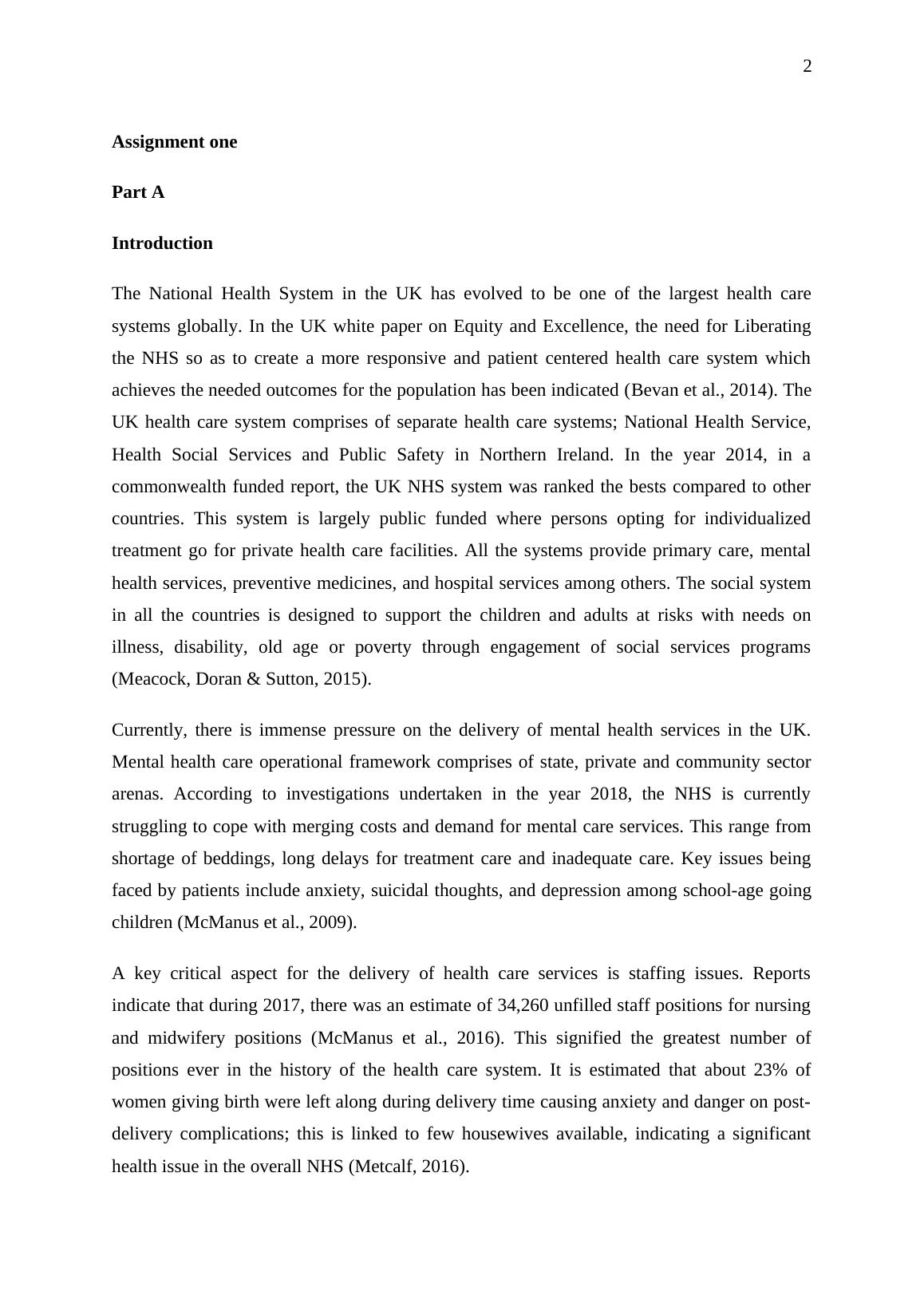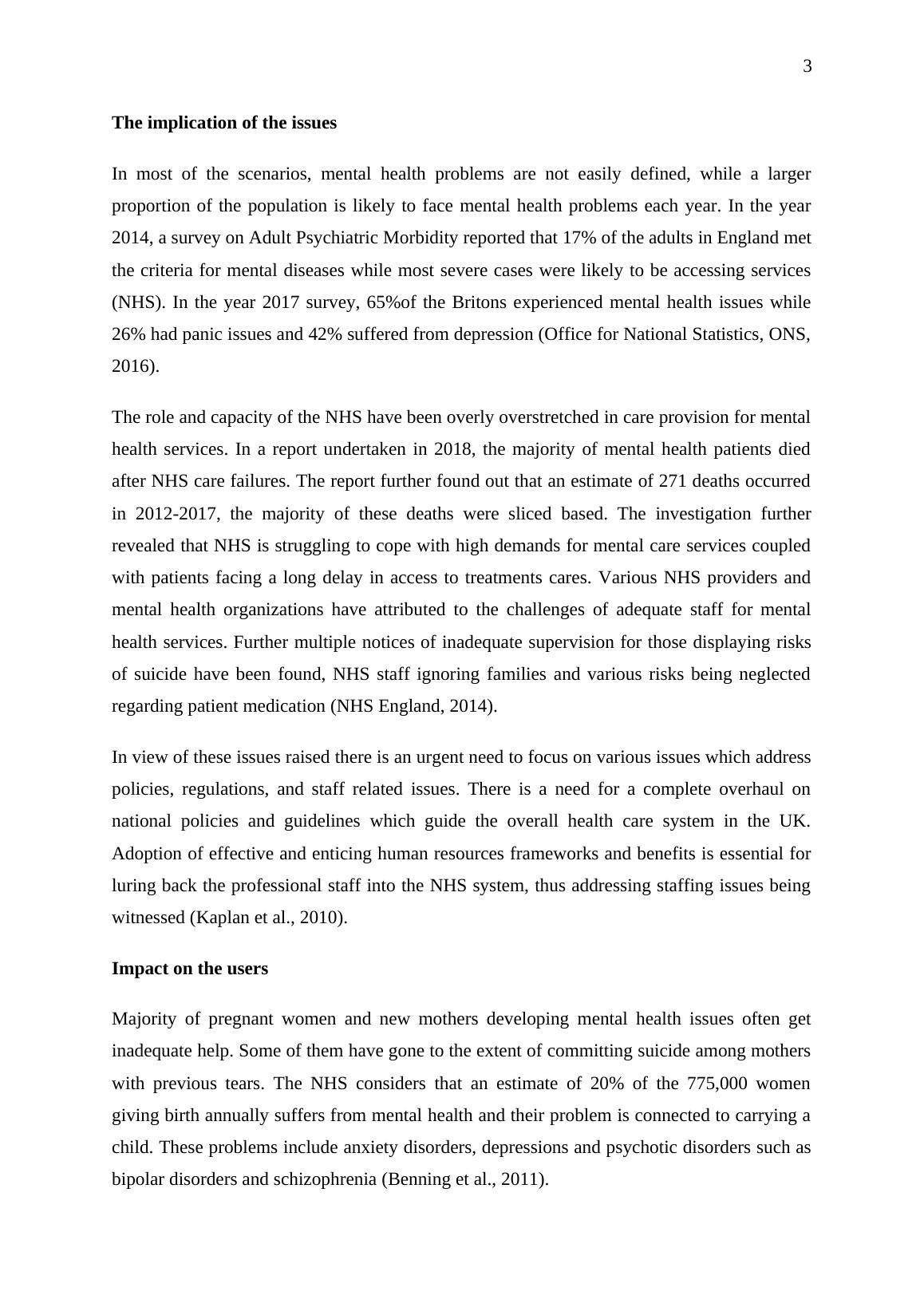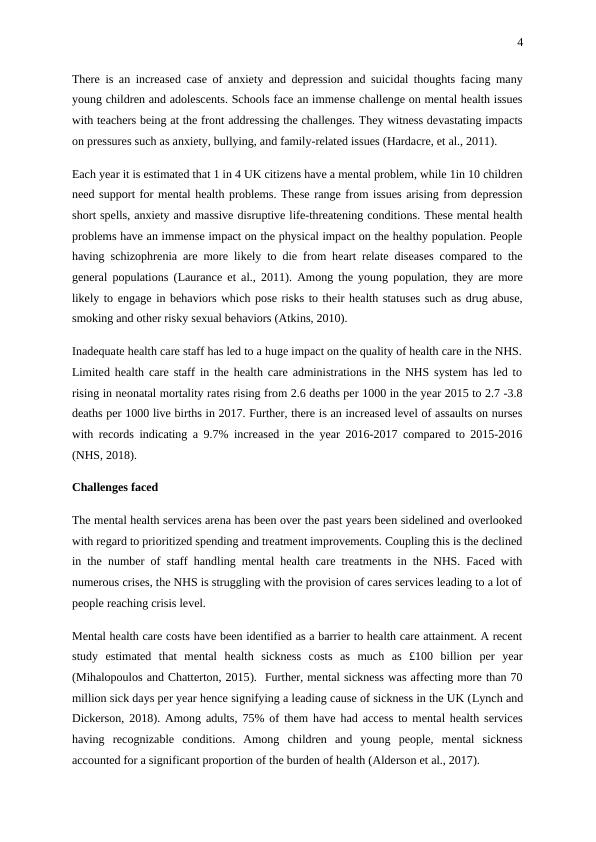Challenges and Implications of Mental Health Services in the UK NHS System
Added on 2023-04-23
14 Pages4450 Words145 Views
Report Analysis
Name
Tutor
Date
Name
Tutor
Date

2
Assignment one
Part A
Introduction
The National Health System in the UK has evolved to be one of the largest health care
systems globally. In the UK white paper on Equity and Excellence, the need for Liberating
the NHS so as to create a more responsive and patient centered health care system which
achieves the needed outcomes for the population has been indicated (Bevan et al., 2014). The
UK health care system comprises of separate health care systems; National Health Service,
Health Social Services and Public Safety in Northern Ireland. In the year 2014, in a
commonwealth funded report, the UK NHS system was ranked the bests compared to other
countries. This system is largely public funded where persons opting for individualized
treatment go for private health care facilities. All the systems provide primary care, mental
health services, preventive medicines, and hospital services among others. The social system
in all the countries is designed to support the children and adults at risks with needs on
illness, disability, old age or poverty through engagement of social services programs
(Meacock, Doran & Sutton, 2015).
Currently, there is immense pressure on the delivery of mental health services in the UK.
Mental health care operational framework comprises of state, private and community sector
arenas. According to investigations undertaken in the year 2018, the NHS is currently
struggling to cope with merging costs and demand for mental care services. This range from
shortage of beddings, long delays for treatment care and inadequate care. Key issues being
faced by patients include anxiety, suicidal thoughts, and depression among school-age going
children (McManus et al., 2009).
A key critical aspect for the delivery of health care services is staffing issues. Reports
indicate that during 2017, there was an estimate of 34,260 unfilled staff positions for nursing
and midwifery positions (McManus et al., 2016). This signified the greatest number of
positions ever in the history of the health care system. It is estimated that about 23% of
women giving birth were left along during delivery time causing anxiety and danger on post-
delivery complications; this is linked to few housewives available, indicating a significant
health issue in the overall NHS (Metcalf, 2016).
Assignment one
Part A
Introduction
The National Health System in the UK has evolved to be one of the largest health care
systems globally. In the UK white paper on Equity and Excellence, the need for Liberating
the NHS so as to create a more responsive and patient centered health care system which
achieves the needed outcomes for the population has been indicated (Bevan et al., 2014). The
UK health care system comprises of separate health care systems; National Health Service,
Health Social Services and Public Safety in Northern Ireland. In the year 2014, in a
commonwealth funded report, the UK NHS system was ranked the bests compared to other
countries. This system is largely public funded where persons opting for individualized
treatment go for private health care facilities. All the systems provide primary care, mental
health services, preventive medicines, and hospital services among others. The social system
in all the countries is designed to support the children and adults at risks with needs on
illness, disability, old age or poverty through engagement of social services programs
(Meacock, Doran & Sutton, 2015).
Currently, there is immense pressure on the delivery of mental health services in the UK.
Mental health care operational framework comprises of state, private and community sector
arenas. According to investigations undertaken in the year 2018, the NHS is currently
struggling to cope with merging costs and demand for mental care services. This range from
shortage of beddings, long delays for treatment care and inadequate care. Key issues being
faced by patients include anxiety, suicidal thoughts, and depression among school-age going
children (McManus et al., 2009).
A key critical aspect for the delivery of health care services is staffing issues. Reports
indicate that during 2017, there was an estimate of 34,260 unfilled staff positions for nursing
and midwifery positions (McManus et al., 2016). This signified the greatest number of
positions ever in the history of the health care system. It is estimated that about 23% of
women giving birth were left along during delivery time causing anxiety and danger on post-
delivery complications; this is linked to few housewives available, indicating a significant
health issue in the overall NHS (Metcalf, 2016).

3
The implication of the issues
In most of the scenarios, mental health problems are not easily defined, while a larger
proportion of the population is likely to face mental health problems each year. In the year
2014, a survey on Adult Psychiatric Morbidity reported that 17% of the adults in England met
the criteria for mental diseases while most severe cases were likely to be accessing services
(NHS). In the year 2017 survey, 65%of the Britons experienced mental health issues while
26% had panic issues and 42% suffered from depression (Office for National Statistics, ONS,
2016).
The role and capacity of the NHS have been overly overstretched in care provision for mental
health services. In a report undertaken in 2018, the majority of mental health patients died
after NHS care failures. The report further found out that an estimate of 271 deaths occurred
in 2012-2017, the majority of these deaths were sliced based. The investigation further
revealed that NHS is struggling to cope with high demands for mental care services coupled
with patients facing a long delay in access to treatments cares. Various NHS providers and
mental health organizations have attributed to the challenges of adequate staff for mental
health services. Further multiple notices of inadequate supervision for those displaying risks
of suicide have been found, NHS staff ignoring families and various risks being neglected
regarding patient medication (NHS England, 2014).
In view of these issues raised there is an urgent need to focus on various issues which address
policies, regulations, and staff related issues. There is a need for a complete overhaul on
national policies and guidelines which guide the overall health care system in the UK.
Adoption of effective and enticing human resources frameworks and benefits is essential for
luring back the professional staff into the NHS system, thus addressing staffing issues being
witnessed (Kaplan et al., 2010).
Impact on the users
Majority of pregnant women and new mothers developing mental health issues often get
inadequate help. Some of them have gone to the extent of committing suicide among mothers
with previous tears. The NHS considers that an estimate of 20% of the 775,000 women
giving birth annually suffers from mental health and their problem is connected to carrying a
child. These problems include anxiety disorders, depressions and psychotic disorders such as
bipolar disorders and schizophrenia (Benning et al., 2011).
The implication of the issues
In most of the scenarios, mental health problems are not easily defined, while a larger
proportion of the population is likely to face mental health problems each year. In the year
2014, a survey on Adult Psychiatric Morbidity reported that 17% of the adults in England met
the criteria for mental diseases while most severe cases were likely to be accessing services
(NHS). In the year 2017 survey, 65%of the Britons experienced mental health issues while
26% had panic issues and 42% suffered from depression (Office for National Statistics, ONS,
2016).
The role and capacity of the NHS have been overly overstretched in care provision for mental
health services. In a report undertaken in 2018, the majority of mental health patients died
after NHS care failures. The report further found out that an estimate of 271 deaths occurred
in 2012-2017, the majority of these deaths were sliced based. The investigation further
revealed that NHS is struggling to cope with high demands for mental care services coupled
with patients facing a long delay in access to treatments cares. Various NHS providers and
mental health organizations have attributed to the challenges of adequate staff for mental
health services. Further multiple notices of inadequate supervision for those displaying risks
of suicide have been found, NHS staff ignoring families and various risks being neglected
regarding patient medication (NHS England, 2014).
In view of these issues raised there is an urgent need to focus on various issues which address
policies, regulations, and staff related issues. There is a need for a complete overhaul on
national policies and guidelines which guide the overall health care system in the UK.
Adoption of effective and enticing human resources frameworks and benefits is essential for
luring back the professional staff into the NHS system, thus addressing staffing issues being
witnessed (Kaplan et al., 2010).
Impact on the users
Majority of pregnant women and new mothers developing mental health issues often get
inadequate help. Some of them have gone to the extent of committing suicide among mothers
with previous tears. The NHS considers that an estimate of 20% of the 775,000 women
giving birth annually suffers from mental health and their problem is connected to carrying a
child. These problems include anxiety disorders, depressions and psychotic disorders such as
bipolar disorders and schizophrenia (Benning et al., 2011).

4
There is an increased case of anxiety and depression and suicidal thoughts facing many
young children and adolescents. Schools face an immense challenge on mental health issues
with teachers being at the front addressing the challenges. They witness devastating impacts
on pressures such as anxiety, bullying, and family-related issues (Hardacre, et al., 2011).
Each year it is estimated that 1 in 4 UK citizens have a mental problem, while 1in 10 children
need support for mental health problems. These range from issues arising from depression
short spells, anxiety and massive disruptive life-threatening conditions. These mental health
problems have an immense impact on the physical impact on the healthy population. People
having schizophrenia are more likely to die from heart relate diseases compared to the
general populations (Laurance et al., 2011). Among the young population, they are more
likely to engage in behaviors which pose risks to their health statuses such as drug abuse,
smoking and other risky sexual behaviors (Atkins, 2010).
Inadequate health care staff has led to a huge impact on the quality of health care in the NHS.
Limited health care staff in the health care administrations in the NHS system has led to
rising in neonatal mortality rates rising from 2.6 deaths per 1000 in the year 2015 to 2.7 -3.8
deaths per 1000 live births in 2017. Further, there is an increased level of assaults on nurses
with records indicating a 9.7% increased in the year 2016-2017 compared to 2015-2016
(NHS, 2018).
Challenges faced
The mental health services arena has been over the past years been sidelined and overlooked
with regard to prioritized spending and treatment improvements. Coupling this is the declined
in the number of staff handling mental health care treatments in the NHS. Faced with
numerous crises, the NHS is struggling with the provision of cares services leading to a lot of
people reaching crisis level.
Mental health care costs have been identified as a barrier to health care attainment. A recent
study estimated that mental health sickness costs as much as £100 billion per year
(Mihalopoulos and Chatterton, 2015). Further, mental sickness was affecting more than 70
million sick days per year hence signifying a leading cause of sickness in the UK (Lynch and
Dickerson, 2018). Among adults, 75% of them have had access to mental health services
having recognizable conditions. Among children and young people, mental sickness
accounted for a significant proportion of the burden of health (Alderson et al., 2017).
There is an increased case of anxiety and depression and suicidal thoughts facing many
young children and adolescents. Schools face an immense challenge on mental health issues
with teachers being at the front addressing the challenges. They witness devastating impacts
on pressures such as anxiety, bullying, and family-related issues (Hardacre, et al., 2011).
Each year it is estimated that 1 in 4 UK citizens have a mental problem, while 1in 10 children
need support for mental health problems. These range from issues arising from depression
short spells, anxiety and massive disruptive life-threatening conditions. These mental health
problems have an immense impact on the physical impact on the healthy population. People
having schizophrenia are more likely to die from heart relate diseases compared to the
general populations (Laurance et al., 2011). Among the young population, they are more
likely to engage in behaviors which pose risks to their health statuses such as drug abuse,
smoking and other risky sexual behaviors (Atkins, 2010).
Inadequate health care staff has led to a huge impact on the quality of health care in the NHS.
Limited health care staff in the health care administrations in the NHS system has led to
rising in neonatal mortality rates rising from 2.6 deaths per 1000 in the year 2015 to 2.7 -3.8
deaths per 1000 live births in 2017. Further, there is an increased level of assaults on nurses
with records indicating a 9.7% increased in the year 2016-2017 compared to 2015-2016
(NHS, 2018).
Challenges faced
The mental health services arena has been over the past years been sidelined and overlooked
with regard to prioritized spending and treatment improvements. Coupling this is the declined
in the number of staff handling mental health care treatments in the NHS. Faced with
numerous crises, the NHS is struggling with the provision of cares services leading to a lot of
people reaching crisis level.
Mental health care costs have been identified as a barrier to health care attainment. A recent
study estimated that mental health sickness costs as much as £100 billion per year
(Mihalopoulos and Chatterton, 2015). Further, mental sickness was affecting more than 70
million sick days per year hence signifying a leading cause of sickness in the UK (Lynch and
Dickerson, 2018). Among adults, 75% of them have had access to mental health services
having recognizable conditions. Among children and young people, mental sickness
accounted for a significant proportion of the burden of health (Alderson et al., 2017).

End of preview
Want to access all the pages? Upload your documents or become a member.
Related Documents
The Impact of Cognitive Behavioural Therapy (CBT) in the management of anxiety on patients with a diagnosis of mental illnesslg...
|20
|5896
|178
The development of social and mental healthlg...
|8
|2711
|12
Advancing Professional Decision Making in Health or Health Care Systemslg...
|21
|8564
|107
Assessing the Effectiveness of Counselling and Monitoring Depression - A Case Study on NHSlg...
|32
|8327
|479
Mental Health for Older Adults: Implications of Electroconvulsive Therapylg...
|12
|3254
|482
Global Health and Sustainability: Mental Health Concerns Among Adults in the UKlg...
|15
|5114
|412
